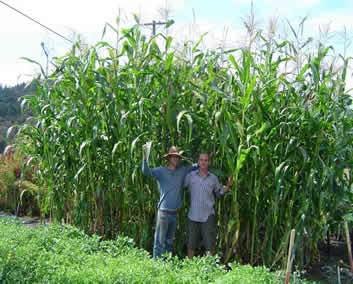Principle 5:
Carbon Farming
Goal: Support closed-system
sustainable soil fertility
“Carbon” refers to plant material, also called “biomass,” that has a lot of complex cell structures and meets the criteria for mature material for compost building. Carbon farming promotes sustainable soil fertility by focusing on growing crops that produce a large amount of carbonaceous material (mature material) for composting. A farmer in tune with producing enough mature compost material will grow these crops in at least 60% of the cultivated area. By focusing on growing enough compost material through choosing carbon-producing crops, a farmer becomes more self-sufficient, relying on his/her own compost for soil fertility instead of buying resources from off of the farm.
Roll over the picture with your mouse to view second image
Images: As shown here, grains like corn (maize) and wheat, as well as others, can produce large quantities of soil-building biomass in addition to producing a crop of edible grain.Some crops of importance are: maize, sorghum, amaranth, quinoa, millet, rye, wheat, barley, rice, oats, and sunflowers. An important production goal for mature compost material is an average of 30 lbs (13.5 kg) of air-dry material per 100 ft² (10 m²) bed. A sustainable farming system focuses on crops that have this potential.
In addition, carbon farming has a diet element. The important cereal crops mentioned above also produce an edible seed. Emphasizing crops that produce compost material AND a significant amount of calorie-rich food sustains the soil and the farmer!
Hint:
Mix legumes and grains for a diverse cover crop that fixes nitrogen and benefits the soil system with dense, soil-loosening roots.
Carbon farming can be enhanced by growing a small area of perennial crops like alfalfa that can produce large quantities of immature compost material. Growing cover crops in the off-season keeps the soil covered and supports sustainable soil fertility with more compost material. Keeping something growing in the soil at all times is an important farming practice for soil building and compost material, worth the extra planning it requires.
GB Farmer’s Challenge:
earn which crops are the best producers of mature material and edible seeds in your area and focus on growing and eating these. Always plan to plant enough carbon crops for your compost needs .
